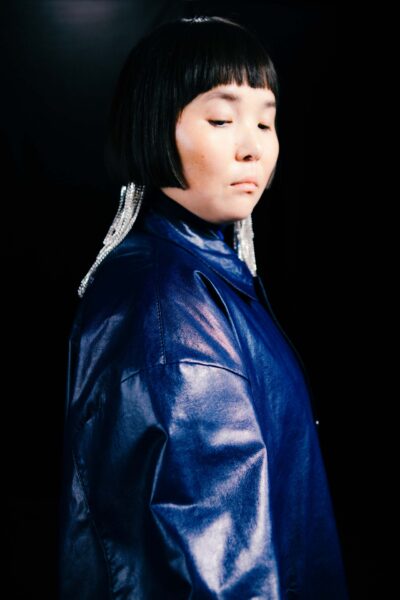Sonor is an album that arrives with the gentle inevitability of dusk, casting everything it touches in a warm, amber glow. From the first notes, there’s a sense of ease and organic flow—music that feels both rooted and airborne. Sonor is extremely soothing, its arrangements breathing with the quiet confidence of an artist who has found comfort in liminality. The instrumentation is subtle yet rich, with the vocals by Enji gliding effortlessly over jazz-inflected harmonies and acoustic textures.
What makes the record so captivating is its ability to sound both timeless and new. Enji draws from the Mongolian urtiin duu (long song) tradition—those long, free-form melodies that seem to stretch time—while weaving in the improvisational spirit of contemporary jazz. The result is a record that never feels forced or contrived; instead, it unfolds with the naturalness of a conversation between old friends. There’s a sense of openness and space in the music, as if Enji is inviting the listener to slow down and immerse themselves.
The Sound and Meaning of Home
At the heart of it all is the concept of existing in different worlds. Born in Ulaanbaatar, Mongolia and now living in Germany, Enji navigates this feeling intimately: a nostalgic sensation that hits you when you revisit what once felt like home, still is home, but subtly emphasizes how much you’ve changed. As Enji puts it, “My last two albums told my stories from here to home. This time it is about a more universal feeling. I don’t know if you know the feeling of being at home and not really being at home. When things that are very familiar to you become a bit unfamiliar. Some things have changed and grown inside you, because every experience you have in my life and all the people you meet are constantly changing you.” Surely everyone who has left their hometown can relate to this to some extent. Enji took that feeling and transformed it into the beautiful ballad “Ergelt”.
For Enji, the concept of existing in different worlds extends beyond geography. Sonor is the first record to feature the German language. “I am very fascinated by the German language. It has such a beautiful way of expression, and I even like the pronunciation.” As she adds with a laugh, fully aware of the unpopularity of this opinion. But her choice is not purely aesthetic: “I just think about the music and how I can best tell the story. Mostly, that still means using my language, Mongolian, I still find words there. But I have always found it interesting to bring in different languages, which means different rhythms and different sounds. If you don’t understand the language, it can give you some freedom to just let the music and the sound happen.”
Images flow before my eyes
As if words I read come to life.
Though I wish to escape this feeling
I know not which door leads back.
Eyes full of joy sadden me
For which I fail to find words for.
I don’t know, yet I do
I don’t know, yet I do
Although my own, I can’t remember.
Although it’s gone, it will return.
– translated lyrics of “ERGELT “/ Эргэлт (Return)
Where Genres Fade
The in-between doesn’t stop here either. Sonically, Enji also finds herself straddling two homes: Mongolian folk and jazz, both deeply entwined in her artistic identity and tools for self-expression. Or, as she puts it: “For me, music is not like something that relates to time. Mongolian folk music has always been a very important part of me. When jazz came into my life, it opened up so many perspectives and sounds in my life. Maybe I’ll discover new genres in the future, but that doesn’t mean that anything new is stronger than the past. When I tell my story, when I want to express something through music, all these elements will appear – they all coexist within me. It’s the experiences, the music in me, no matter what genre.”
Thus, Enji emphasizes she never consciously sought to blend jazzy Mongolian folk. Her artistic approach is more organic: “I think it would be so difficult to do something forced,” she explains. “Like it has to sound Mongolian because I’m Mongolian. Or it has to sound like jazz because I’ve studied jazz. I don’t want to think in those boxes, I just do what feels true to me.”
Her path to becoming a performing artist wasn’t straightforward or planned either. Growing up in Mongolia, Enji recalls, “I didn’t really see myself as an artist or a singer because I wasn’t attracted to the idea of being a singer in Mongolia at that time. You have to be, I don’t know, beautiful, you have to have a big sponsor.” Disenchanted by the industry she saw around national pop stars, but with music still a central part of her life, she studied to become a music teacher. It was later that she discovered jazz, which opened up new artistic perspectives for her. “I found the same freedom in jazz that I found in traditional singing and traditional Mongolian music.”
First Time’s the Charm
This sense of freedom carries over to her collaborative work. “In jazz, everyone’s voice is so important,” Enji explains. “You don’t have to change or even adapt yourself to make it fit. It’s not like I’m the lead singer and the band is just in the background, it’s a real collaboration. It is a very equal, democratic way of making music. In jazz, I can be myself.”

Photo by Hanne Kaunicnik
When talking about the process of recording Sonor, Enji had nothing but kind words and appreciation for her accompanying musicians. Next to long-time collaborator Paul Brändle on guitar, she invited Elias Stemeseder on piano, Wurlitzer, Rhodes, Robert Landfermann on double bass and Julian Sartorius on drums—a group of established jazz musicians who bring their own styles and influences to the table.
Listening to the result, it is hard to believe that the day of the recording was also the first time they had all met in person. With all instrumentalists in just one room and playing simultaneously, the recording was completed in just two days. “It felt very intimate and immediately very comfortable. We didn’t really have time to rehearse, we just started recording. That means a lot of moments and a lot of unplanned sounds,” Enji recalls. This may explain why the album sounds so wonderfully organic.
Too Jazzy, Too Folky, Just Right
Navigating the industry as an artist who defies easy categorization has not been without its challenges. “When I moved here to Germany, I realised that people have very specific stereotypes. I felt like everyone was expecting something exotic and folky from me. And I am that, I enjoy traditional singing, but I am also a jazz singer. I even had the feeling I would sell more if I would make myself fit either stereotype. For a while, I even stopped gigging, but then the pandemic hit and I had time to really define and understand who I am as an artist. Maybe it sounds poppy sometimes, and sometimes more Mongolian, not jazzy enough, but I don’t care.” Which turned out to be a success story.
Rather than confining herself to a single lane, Enji moves confidently between genres and scenes, without ever diluting her sound. Last year, Enji was nominated for the Anchor Award at the Reeperbahn Festival alongside pop-rock and R&B artists, and this year she is up for the German Jazz Prize—a testament to her ability to cross boundaries without compromise. Whether performing in intimate jazz venues or on the stages of international festivals, Enji never seems out of place.
Enji‘s gift for bridging worlds—musically and culturally—shows no signs of slowing down. I wouldn’t have guessed that one of her dream collaborators would be Little Simz, yet I totally see it and can’t wait to see what is next for her. Meanwhile, her advice on how to experience Sonor remains simple: “Sonor is a reverent name for ears, but it also means listening carefully and being aware. So I just hope that people will allow themselves to dive into the music, listen carefully with open ears, and maybe it will bring some new sounds into their lives.”
Sonor is out now via Squama. Be sure to catch Enji live on her upcoming tour. You can stay up to date with Enji via Instagram.



